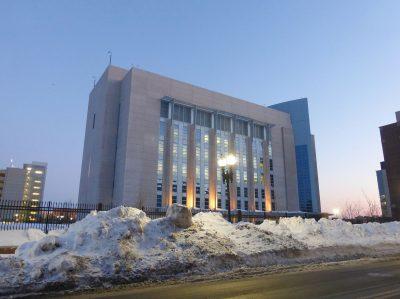
Researchers at the National Emerging Infectious Diseases Laboratories at Boston University are taking advantage of their unique facility in the global effort to develop effective vaccines and drug treatments to COVID-19.
Mohsan Saeed, an assistant professor of biochemistry at the BU School of Medicine, conducts research in emerging viruses at NEIDL. The laboratory, Saeed said, places BU at an advantage relative to other institutions in research of infectious diseases.
“BU is in a unique position because we have this laboratory,” Saeed said. “Here we have a [biosafety level 3] facility, which is required to work on this SARS coronavirus. Many other institutes in the city do not have this facility.”
There are four levels of biosafety in laboratories, depending on how dangerous the pathogen is. BSL-1 deals with pathogens that are non infectious for humans, and BSL-4 deals with highly fatal diseases that do not have effective vaccines or treatment, such as Ebola, Saeed said.
The NEIDL lab at BU is designated as BSL-3, which Saeed said deals with viruses like the SARS coronavirus, the novel strain of coronavirus and yellow fever. At this level, researchers take many steps to protect themselves from potential contamination — wearing masks, two layers of gloves, shoe covers and showering afterward, Saeed said.
“Depending upon the bio containment level, the room in which you work with the virus is very different,” Saeed said. “Working with a BSL-3 pathogen … you have to cover your whole body … you work with a virus and then, once you are done, then you decontaminate yourself.”
With groups at NEIDL working in three main sectors — vaccine development, antiviral therapy development and understanding the spread of the disease — Saeed said it will take months for these to be developed and tested before approval for human use.
“Now that the virus has spread quite a lot,” Saeed said, “I think that vaccine or antivirals at this point might not be able to control the spread.”
Moderna Therapeutics, a biotechnology company based in Cambridge, developed a vaccine, called the mRNA-1273, for the novel coronavirus and sent it to the National Institute of Allergy and Infectious Diseases for testing Feb. 24, according to a Moderna press release.
The company announced Monday that the first participant has been dosed with the vaccine in a Phase One study by the National Institutes of Health. The study’s 45 healthy adult participants will be evaluated after a 12-month period, according to the press release.
This wait could be shortened given the circumstances, Saeed said, but would still go past what he said would hopefully be the end of the pandemic.
“All these things are going to take some time,” Saeed said. “Because it’s an emergency situation, even if we expedite it, I think it’s not going to be less than seven to eight months.”
Sandro Galea, dean of the BU School of Public Health, wrote in his March 13 Dean’s Note entitled “Four Lessons from COVID-19” that the pandemic is a “public health emergency” that reveals flaws in how society views health.
“We think about the health of individuals,” Galea wrote. “[But] it is about public health—about improving the health of populations.”
Galea chairs the Massachusetts Public Health Association’s Emergency Task Force on Coronavirus and Equity, which will make recommendations at the State House on Friday for policies that will protect vulnerable communities, according to a BU Today article.
These policies, Galea said, improve conditions for marginalized groups that will be most affected by the pandemic, including the disabled, elderly and low-income individuals.
“We need to create guidelines and suggestions for the Commonwealth to make sure that we have policies in place to protect those who are most vulnerable in a [time] of change,” Galea said. “Those groups we often don’t think about, but those are the groups who are going to be most affected.”
Jesse Dubin, a fourth semester graduate student in SPH, said their certificate in Health Policy and Law uses social justice and public health frameworks to better understand the world. Dubin said Galea and the Task Force are using this lens of equity and social justice to improve policy in response to the coronavirus.
“[The task force] is helping to make sure that in our addressing of this now, pandemic, that we don’t continue to harm the populations that have been harmed by our society,” Dubin said. “That we think about and advocate for populations that will suffer unintended or unconsidered consequences of these public health actions.”
Public health is more than the hard science many people think of, Dubin said, as it largely deals with people and social structures.
“Public health is not just a medical issue, it’s not just a viral issue … we’re talking about people as groups of people, as a society of people, as communities of people,” Dubin said. “And that’s more than just science and data. It’s also about human social interactions.”
The pandemic, Galea said, offers an opportunity for researchers at BU and around the globe to continue to learn and improve their scientific knowledge and understanding.
“I think this virus highlights how much room there is for research and how much there is that we need to learn,” Galea said. “A moment for us to do more science and better science.”





























































































































